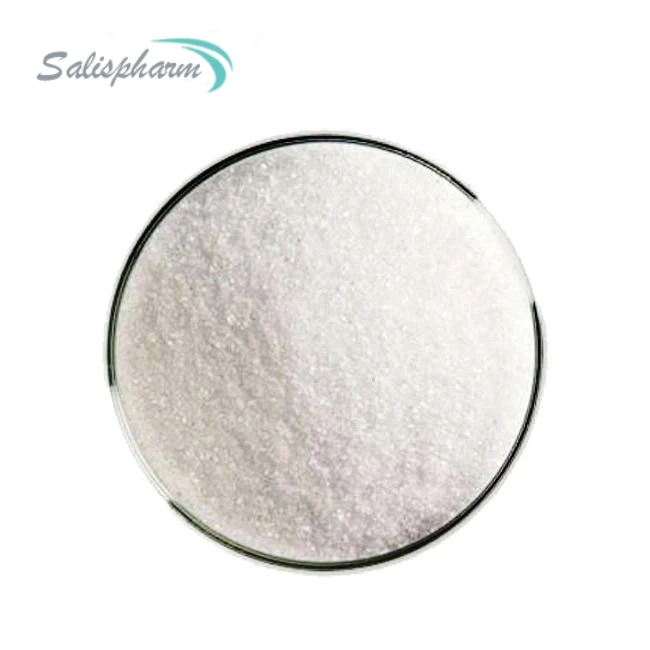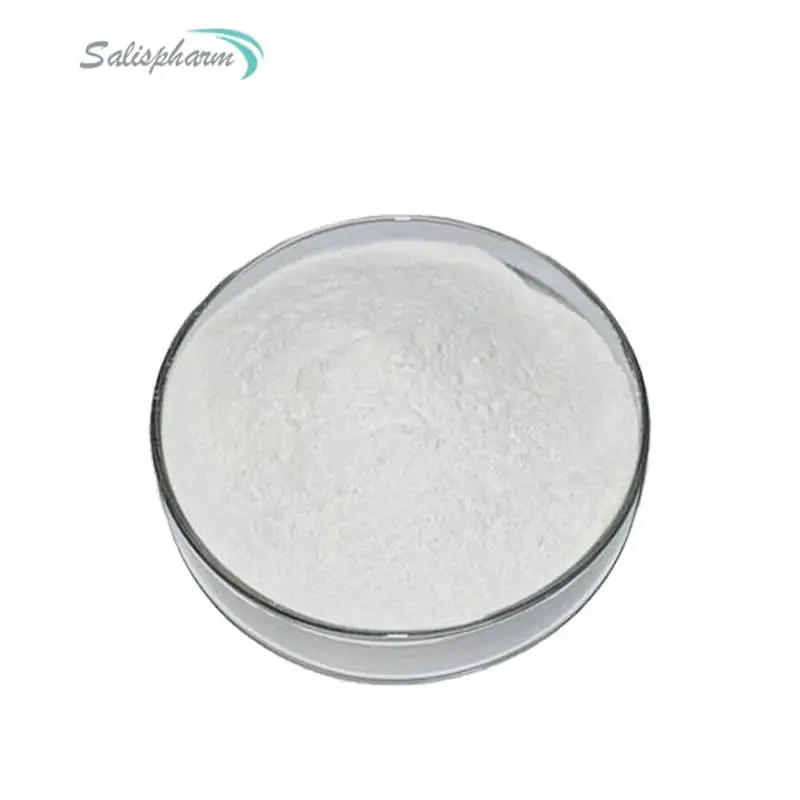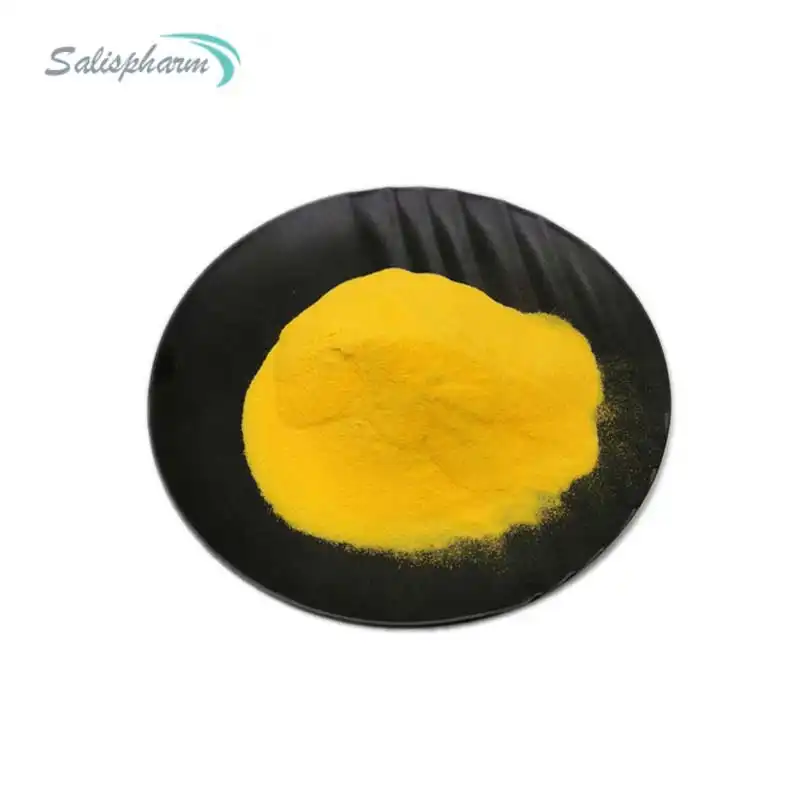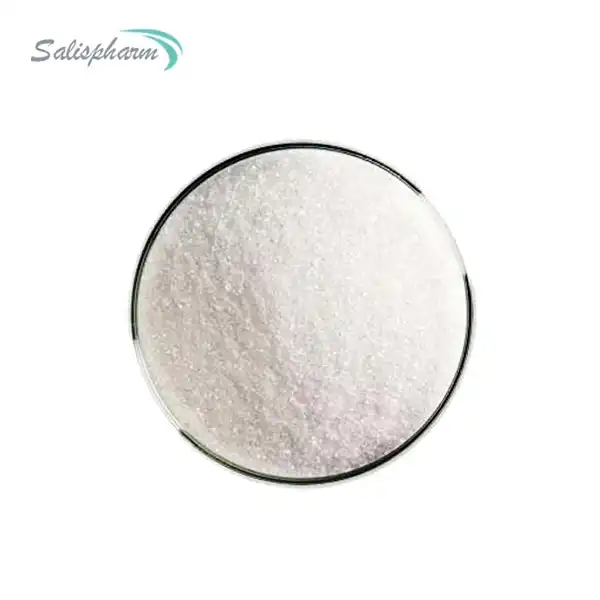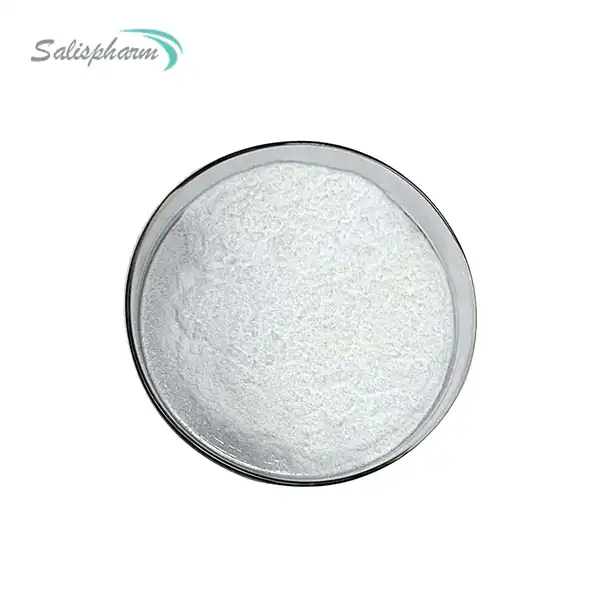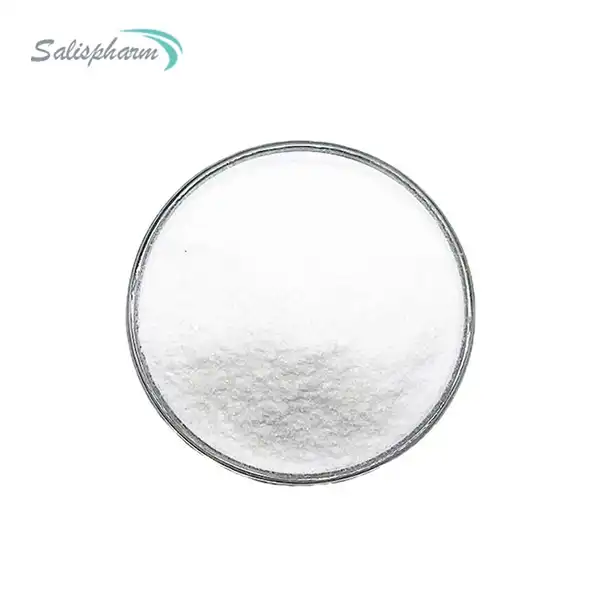Benfotiamine powder is a fat-soluble form of thiamine (vitamin B1) that has gained popularity for its potential health benefits. Many people are curious about how to properly incorporate this supplement into their daily routine. In this comprehensive guide, we'll explore the best practices for taking benfotiamine powder, its potential benefits, and answer some common questions about its usage.
What is the recommended dosage for benfotiamine powder?
Determining the appropriate dosage of benfotiamine powder is crucial for maximizing its benefits while ensuring safety. The recommended dosage can vary depending on several factors, including the individual's health condition, age, and the specific purpose for taking the supplement.
Generally, the typical dosage range for benfotiamine powder is between 150 mg to 300 mg per day, divided into two or three doses. However, it's important to note that some studies have used higher doses, up to 900 mg per day, for specific therapeutic purposes. Always start with a lower dose and gradually increase it if necessary, under the guidance of a healthcare professional.
For general health maintenance and mild deficiency prevention, a daily dose of 150 mg to 250 mg is often sufficient. Those with diabetes or neuropathy may benefit from higher doses, typically in the range of 300 mg to 600 mg per day. However, it's crucial to consult with a healthcare provider before starting any new supplement regimen, especially if you have pre-existing health conditions or are taking medications.
When measuring benfotiamine powder, precision is key. Using a digital scale that can accurately measure milligrams is recommended to ensure you're taking the correct amount. If you don't have access to a precise scale, many suppliers provide small scoops with their benfotiamine powder, typically measuring about 100 mg per scoop. However, it's important to verify the exact measurement of these scoops, as they can vary between manufacturers.
Remember that consistency is important when taking benfotiamine. Try to take it at the same times each day to maintain steady levels in your system. Some people prefer to divide their daily dose into two or three smaller doses throughout the day to promote better absorption and maintain more consistent blood levels of the vitamin.
It's also worth noting that while benfotiamine is generally considered safe, exceeding the recommended dosage does not necessarily lead to better results and may increase the risk of side effects. Always follow the dosage instructions provided by your healthcare provider or the product manufacturer, and don't hesitate to ask for guidance if you're unsure about the appropriate amount for your specific needs.
Can benfotiamine powder be mixed with food or drinks?
One of the great advantages of benfotiamine powder is its versatility in terms of administration. Unlike some supplements that have strict requirements for consumption, benfotiamine powder can be mixed with a variety of foods and drinks, making it easier to incorporate into your daily routine.
Benfotiamine is fat-soluble, which means it dissolves in fats and oils rather than water. This property not only enhances its absorption in the body but also provides flexibility in how you can take it. Here are some ways you can mix benfotiamine powder with food or drinks:
1. Mix with fatty foods: For optimal absorption, consider mixing benfotiamine powder with foods that contain healthy fats. This could include adding it to a spoonful of yogurt, blending it into a smoothie with avocado or coconut oil, or stirring it into nut butter.
2. Incorporate into meals: You can sprinkle benfotiamine powder over your meals, particularly those containing fats. For example, you could add it to a salad with olive oil dressing, mix it into a serving of scrambled eggs, or stir it into a bowl of oatmeal with a dollop of almond butter.
3. Blend into smoothies or shakes: Benfotiamine powder can be easily blended into smoothies or protein shakes. This method is particularly effective if your shake includes ingredients like full-fat yogurt, nut milk, or chia seeds, which provide the fats necessary for optimal absorption.
4. Mix with warm beverages: While benfotiamine doesn't dissolve well in water, you can mix it into warm, creamy beverages like lattes made with whole milk or plant-based milk alternatives that contain fats.
5. Create a paste: Some users prefer to mix benfotiamine powder with a small amount of coconut oil or MCT oil to create a paste, which can then be consumed directly or added to foods.
When mixing benfotiamine powder with food or drinks, there are a few important points to keep in mind:
- Taste considerations: Benfotiamine has a slightly bitter taste that some people may find noticeable. Mixing it with strongly flavored foods or drinks can help mask this taste if you find it unpleasant.
- Temperature sensitivity: While benfotiamine is generally stable, it's best to avoid mixing it with very hot foods or beverages, as extreme heat could potentially degrade the vitamin.
- Timing of consumption: For best results, consume the food or drink containing benfotiamine powder immediately after mixing. This ensures you're getting the full dose and prevents any potential degradation of the vitamin.
- Even distribution: When mixing with food, ensure that the powder is evenly distributed to guarantee you're getting the full intended dose.
- Avoid acidic combinations: While not strictly necessary, some sources suggest avoiding mixing benfotiamine with highly acidic foods or drinks, as this might affect its stability or absorption.
It's worth noting that while mixing benfotiamine powder with food or drinks can make it more palatable and easier to take, it's not strictly necessary for the supplement to be effective. If you prefer, you can take the powder directly, followed by a meal or snack containing some fat to aid absorption.
Remember, consistency is key when taking any supplement. Find a method of taking benfotiamine powder that works well for you and fits easily into your daily routine. This will help ensure that you're getting the supplement regularly and maximizing its potential benefits.
How long does it take to see results from benfotiamine powder?
The time it takes to see results from taking benfotiamine powder can vary significantly from person to person. Several factors influence the timeline for experiencing noticeable effects, including the individual's initial thiamine levels, the specific condition being addressed, the dosage being taken, and overall health status. Understanding these variables can help set realistic expectations for those incorporating benfotiamine into their health regimen.
Short-term effects:
Some individuals report feeling certain effects relatively quickly after starting benfotiamine supplementation. These short-term effects can include:
1. Increased energy levels: Some users report feeling more energetic within a few days to a week of starting benfotiamine. This is particularly noticeable in individuals who had a pre-existing thiamine deficiency.
2. Improved mood: Thiamine plays a role in neurotransmitter production, and some people notice mood improvements within the first few weeks of supplementation.
3. Better sleep quality: Some users report improvements in sleep patterns and quality within the first month of regular use.
4. Enhanced cognitive function: Improvements in focus, clarity of thought, and memory might be noticeable within a few weeks to a month for some individuals.
Long-term effects:
For more significant health benefits, particularly those related to chronic conditions, it often takes longer to see noticeable results. Here are some timelines for various conditions:
1. Diabetic neuropathy: Studies have shown improvements in symptoms of diabetic neuropathy after 6 to 12 weeks of benfotiamine supplementation. However, some patients may need to continue treatment for several months to experience significant relief.
2. Cardiovascular health: The effects of benfotiamine on heart health markers may take several months to become apparent. Studies examining its impact on endothelial function and markers of vascular health often run for 3 to 6 months.
3. Alzheimer's disease and cognitive function: Research on benfotiamine's potential benefits for cognitive health and Alzheimer's disease typically involves long-term supplementation, often 6 months to a year or more.
4. General health and prevention: For those taking benfotiamine as a general health supplement or for preventive purposes, the effects may not be immediately noticeable. The benefits in these cases are often cumulative and may become apparent over months or years of consistent use.
Factors affecting the timeline:
1. Initial thiamine status: Individuals with severe thiamine deficiency may notice more rapid and dramatic improvements compared to those with adequate levels.
2. Dosage: Higher doses of benfotiamine may produce more rapid effects, although it's crucial to follow recommended dosages and consult with a healthcare provider.
3. Consistency: Regular, consistent supplementation is key to seeing results. Sporadic use may delay or diminish the potential benefits.
4. Individual metabolism: Differences in how individuals absorb and metabolize benfotiamine can affect how quickly they experience results.
5. Overall health and lifestyle: Factors such as diet, exercise, stress levels, and other health conditions can influence how quickly and significantly one responds to benfotiamine supplementation.
6. Severity of the condition: For those using benfotiamine to address specific health concerns, the severity and duration of the condition can impact how quickly improvements are noticed.
It's important to note that while some people may experience rapid benefits from benfotiamine supplementation, for others, the effects may be more subtle or take longer to become apparent. This doesn't necessarily mean the supplement isn't working; many of its benefits may be occurring at a cellular level that isn't immediately perceptible.
Monitoring progress:
To better track the effects of benfotiamine supplementation:
1. Keep a journal: Note any changes in symptoms, energy levels, mood, or other relevant factors.
2. Regular check-ups: If you're taking benfotiamine for a specific health condition, regular follow-ups with your healthcare provider can help monitor progress through clinical tests and examinations.
3. Be patient: Give the supplement time to work. Most experts recommend trying a supplement regimen for at least 2-3 months before evaluating its effectiveness.
4. Combine with lifestyle changes: Pairing benfotiamine supplementation with a healthy diet, regular exercise, and stress management techniques can enhance its effects and lead to more noticeable improvements.
In conclusion, while some effects of benfotiamine powder may be noticeable within a few weeks, many of its most significant benefits may take months of consistent use to become apparent. It's essential to approach supplementation with realistic expectations and a commitment to long-term health. Always consult with a healthcare professional before starting any new supplement regimen, especially if you have pre-existing health conditions or are taking medications.
If you are also interested in this product and want to know more product details, or want to know about other related products, please feel free to contact iceyqiang@aliyun.com.
References
1. Balakumar, P., et al. (2010). The multifaceted therapeutic potential of benfotiamine. Pharmacological Research, 61(6), 482-488.
2. Stirban, A., et al. (2006). Benfotiamine prevents macro- and microvascular endothelial dysfunction and oxidative stress following a meal rich in advanced glycation end products in individuals with type 2 diabetes. Diabetes Care, 29(9), 2064-2071.
3. Pan, X., et al. (2010). Powerful beneficial effects of benfotiamine on cognitive impairment and beta-amyloid deposition in amyloid precursor protein/presenilin-1 transgenic mice. Brain, 133(5), 1342-1351.
4. Stracke, H., et al. (2008). Benfotiamine in diabetic polyneuropathy (BENDIP): results of a randomised, double blind, placebo-controlled clinical study. Experimental and Clinical Endocrinology & Diabetes, 116(10), 600-605.
5. Hammes, H. P., et al. (2003). Benfotiamine blocks three major pathways of hyperglycemic damage and prevents experimental diabetic retinopathy. Nature Medicine, 9(3), 294-299.
6. Thornalley, P. J. (2005). The potential role of thiamine (vitamin B1) in diabetic complications. Current Diabetes Reviews, 1(3), 287-298.
7. Shoeb, M., & Ramana, K. V. (2012). Anti-inflammatory effects of benfotiamine are mediated through the regulation of the arachidonic acid pathway in macrophages. Free Radical Biology and Medicine, 52(1), 182-190.
8. Schmid, U., et al. (2008). Benfotiamine exhibits direct antioxidative capacity and prevents induction of DNA damage in vitro. Diabetes/Metabolism Research and Reviews, 24(5), 371-377.
9. Volvert, M. L., et al. (2008). Benfotiamine, a synthetic S-acyl thiamine derivative, has different mechanisms of action and a different pharmacological profile than lipid-soluble thiamine disulfide derivatives. BMC Pharmacology, 8, 10.
10. Raj, V., et al. (2018). Therapeutic potential of benfotiamine and its molecular targets. European Review for Medical and Pharmacological Sciences, 22(10), 3261-3273.



